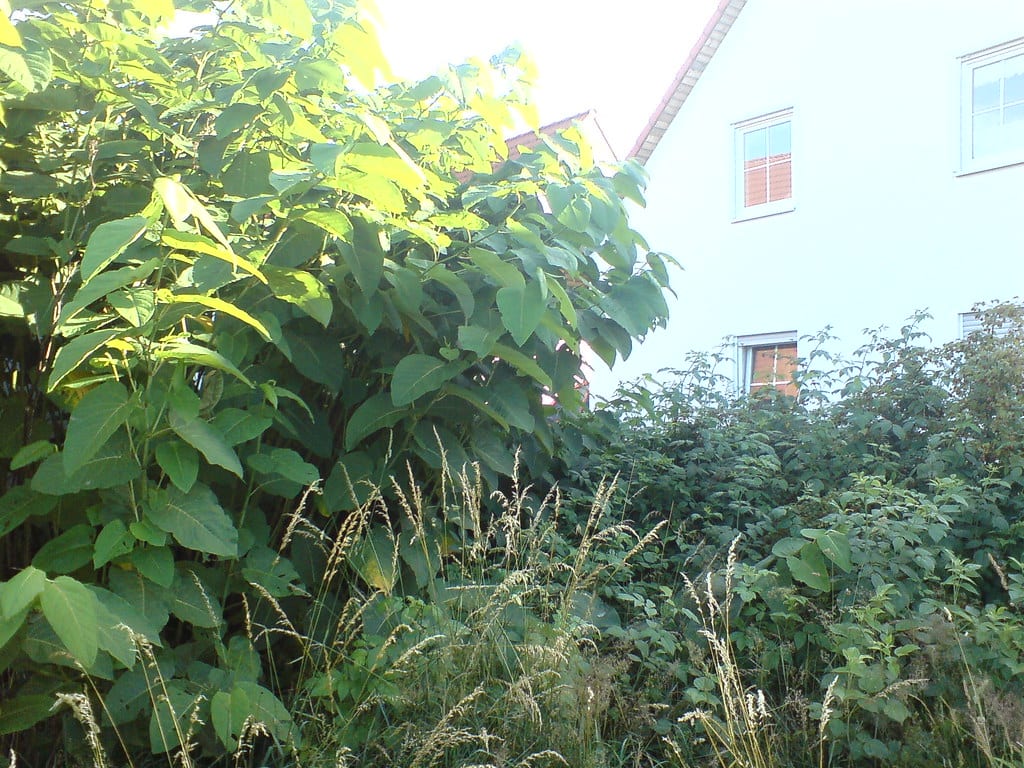Has Your Surveyor Missed Japanese Knotweed?
Despite Japanese knotweed having made a significant impact on the property industry in the last decade, there are still cases where surveyors miss this invasive plant whilst conducting mortgage evaluations, HomeBuyer Reports and RICS Building Surveys. In many of these scenarios, buyers are left in a precarious place, having already invested hundreds of pounds into the home buying process and often reaching the point of no return before making the discovery of an infestation. Thankfully, precedents have been set in Japanese knotweed law which may provide some homeowners relief.
We can answer your Japanese knotweed questions!
Talk To UsThe following guidance is intended for those who have discovered that their surveyor has missed Japanese knotweed:
Contents
Do surveyors look for Japanese knotweed?
RICS qualified surveyors are trained to look for large masses of vegetation that could signify an invasive plant infestation. A professional surveyor is expected to keep up to date with ongoing development in their industry, which includes the common risk factors that could point to a Japanese knotweed problem. The RICS has laid out an assessment framework in their resource materials for Japanese knotweed which includes pre-inspection checks of the local area, an inspection of the property itself and even inspection of neighbouring communal areas.
In the 1st edition of the RICS’ guidance note on Japanese knotweed and residential property, they stipulate that: ‘RICS members must be mindful that Japanese knotweed may be encountered during any inspection. When this happens, the valuer or surveyor should be capable of providing guidance to the client that is appropriate to the level of inspection.’
They also go on to stress that: ‘RICS members should be aware that standard clauses in Terms and Conditions of Engagement attempting to exclude any liability associated with the presence of Japanese knotweed are unlikely to meet the requirements of the Consumer Rights Act 2015 or withstand the scrutiny of the courts.’
We can answer your Japanese knotweed questions!
Talk To UsShould an RICS survey pick up the presence of Japanese knotweed?
Whether or not a particular survey will identify Japanese knotweed will depend on the type of survey that has been commissioned, the scale of the potential infestation, the professionalism of the surveyor and also the extent to which the owner of the property has attempted to conceal the plant.
Not all surveys are created equal. The RICS has a few different types of surveys which cover a range of budgets and scenarios. The cheapest of these is the RICS Condition Report, which costs around £250 and is intended to provide basic information regarding potential legal issues and any urgent problems that the property faces.
In the RICS’ words, the visual inspection of the grounds is a ‘relatively cursory’ part of the process, however in cases where the surveyor is aware that there is a greater risk of Japanese knotweed then this may require ‘particular attention’ on the part of the surveyor.
Whilst the RICS materials do say that a client should purchase a HomeBuyer Report or building survey if they wish to have ‘greater assurance’, this does not always excuse a surveyor from completely missing Japanese knotweed in their survey.
Should a mortgage valuation pick up Japanese knotweed?
A mortgage valuation is not always guaranteed to pick up the presence of Japanese knotweed. A mortgage valuation survey is paid for by a mortgage lender or bank in order to verify that the amount of money that they’re planning on lending is in accordance with the value of the property in question.
A valuation is intended to satisfy the mortgage lender, as such, it will not single out any structural issues, or repairs that will need addressing before a purchase is made. Although the prospective buyer is usually expected to pay for the valuation, a surveyor might not focus their attention on the land surrounding the property.
Related: Getting A Mortgage With Japanese Knotweed
We can answer your Japanese knotweed questions!
Talk To UsHow can a surveyor miss Japanese knotweed?
Surveyors can miss Japanese knotweed on a property for a number of reasons, not all of which suggest that they have acted negligently. Sellers can lie about Japanese knotweed when attempting to sell their property, relying on cheap tricks to hide their infestation in order to push the sale through expediently. A property owner could choose to conceal the Japanese knotweed by burying shoots in the spring with wood chips or topsoil. They might also choose to hack away any evidence of the plant above the surface and fly-tip the evidence.
DIY attempts at treating Japanese knotweed can lead to deformed or sparse growth which may lead surveyors to miss the infestation altogether, or mistakenly identify it as another plant. Similarly, if the homeowner has paid for a professional removal service then the Japanese knotweed might have entered into a dormant phase, where it might remain below the surface for years – completely undetectable to anyone.
In cases where property developers have built on land with Japanese knotweed, the infestation might have been dispersed into the earth that your home has been built on. As knotweed rhizomes can grow from a thumb-size piece into a full-size plant given enough time, a surveyor could easily miss the plant if it is still growing underneath the ground.
What happens if a surveyor missed Japanese knotweed growing on a property you wish to buy?
If a surveyor missed the presence of Japanese knotweed on a house before a purchase is made then the prospective buyer will be unable to rely on legal action to claim back any expenses that might have been accrued leading up to the discovery. Although the potential buyer might have already invested money in seeking a valuation and surveying the property, not to mention spending resources setting up the sale of their own home, unless a contract has been signed, they won’t be able to claim these expenses back from the negligent property surveyor.
What if you buy a house and then discover that the surveyor missed Japanese knotweed on the land?
The discovery of Japanese knotweed on a property can lead to the home being devalued by as much as 5% and can sometimes result in a mortgage lender or bank refusing to lend. A surveyor missing Japanese knotweed can lead to sales falling through and thousands of pounds being wasted. If a Japanese knotweed infestation is discovered on a property after a Home Evaluation Report or RICS HomeBuyer Survey has said otherwise then the buyer may be able to bring legal action against the surveyor for professional negligence.
We can answer your Japanese knotweed questions!
Talk To UsCan I sue my surveyor for missing Japanese knotweed?
It is possible to sue a surveyor for missing Japanese knotweed, in the event that the sale has of the house has gone through and it can be proved that the surveyor has acted negligently. Courts or tribunals will refer to the resources supplied by the RICS in order to determine whether or not a surveyor has acted negligently in missing Japanese knotweed. In assessing each case attention will be paid to the lengths that the surveyor went to survey the property, the context surrounding the property, whether or not there’s Japanese knotweed in neighbouring properties and any notes or recommendations that the surveyor might have made at the time of the survey.
Do surveyors have a duty of care to potential buyers?
According to the RICS Rules of Conduct, all members are required to carry out their work with ‘due skill, care and diligence and with proper regard for the technical standards expected of them’. , In addition to upholding the professional standards expected of them, all surveyors are required to maintain their professional competence by staying up to date with developments in their industry. Surveyors have a duty of care to both the lender and the homebuyer, regardless of if the owner has attempted to hide the infestation. Whether or not a surveyor is deemed to have properly performed their duty of care will depend on the context of the given case, including the type of survey that was ordered and the nature of the property.
Is there precedence for buyers suing surveyors for missing Japanese knotweed?
In May 2019, Paul Ryb was awarded £50,000 after his RICS Level 3 Building Survey failed to pick up the Japanese knotweed that was growing in the garden of his ground-floor London flat. Being partially sighted, Mr Ryb was relying completely on the professional opinion of the property surveyor who completely missed the plant on his survey of the building. The £50,000 awarded to Mr Ryb reflected the reduction in the value of his £1.2 million home, in addition to the thousands of pounds that he was forced to spend on excavating the infestation. Mr Ryb was also awarded £90,000 to cover the costs of his legal fees.
Call us today on 0151 242 9050 or send us an enquiry using the contact form to see if we can help you with your knotweed problem.

